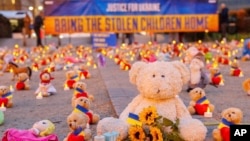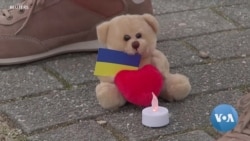The United States announced new sanctions Thursday against several Russian entities and individuals for their roles in the abduction and deportation of Ukrainian children to Russia and for human rights abuses against minors in Russian-occupied areas of Ukraine.
“Children are literally being ripped from their homes. In the year 2023. By a country sitting in this very chamber. By a permanent member of this council,” Ambassador Linda Thomas-Greenfield said at a meeting of the U.N. Security Council. “This is straight out of a dystopian novel. But this is not fiction. Colleagues, this is not fiction. This is real life.”
She said the human rights violations are being orchestrated at all levels of the Russian government and noted that the International Criminal Court at The Hague has issued arrest warrants for President Vladimir Putin and Maria Lvova-Belova, Russia’s presidential commissioner for children’s rights. Those warrants were issued on March 17, for their involvement in the alleged deportation and transfer of children from occupied areas of Ukraine to Russia.
At a meeting held on the 32nd anniversary of Ukraine’s independence from the former Soviet Union, focusing on the protection of children, Thomas-Greenfield said the United States would not stand by “as Russia carries out these war crimes and crimes against humanity.”
“And today, the United States is imposing sanctions on two entities and 11 individuals – including individuals who reportedly have facilitated the forcible transfer and deportation of Ukraine’s children to camps,” Thomas-Greenfield announced. “Additionally, we are taking steps to impose visa restrictions on three Russia-installed purported authorities for their involvement in human rights abuses of Ukrainian minors.”
Among the sanctioned individuals are the commissioners for children’s rights in several Russian regions, as well as a Russian government-owned “summer camp” and its director, located in Russia-occupied Crimea. Washington says the camp conducts “extensive ‘patriotic’ re-education programs” and prevents the children from returning to their families.
A human rights briefer from Ukraine told the council that according to the Ukrainian National Information Bureau, Russian agents have taken at least 19,546 children to 57 regions of Russia since February 2022, and only 386 have returned home. But Ukrainian officials say the real number could be much higher.
“After deportation to Russia or to the temporarily occupied territories of Ukraine, our children are exposed to aggressive brainwashing aimed at changing their consciousness, erasing their Ukrainian identity and preparing obedient soldiers for the Russian army in the future,” Ukrainian Ambassador Sergiy Kyslytsya told the council.
He thanked Washington for imposing sanctions on Russia and urged other countries to do the same.
The Russian envoy dismissed the accusations as lies.
“The lie about our alleged abductions of Ukrainian children, who we are actually saving,” Ambassador Vassily Nebenzia said.
UN reporting
In its annual report on violations against children in conflict zones, the United Nations said in June it had verified the abduction of 91 children by Russian armed forces, all of whom were released. The U.N. also verified the transfer of 46 children to Russia from occupied areas of Ukraine, “including children forcibly separated from parents, children removed from schools and institutions without the consent of guardians, and a child who was given Russian citizenship.”
Verification is difficult and the U.N. has criticized Russia for its lack of cooperation and access. The secretary-general, Antonio Guterres, included Moscow in his annual blacklist of perpetrators of grave violations against children, citing the high number of attacks on schools and numbers of children killed and maimed by Russia’s military and affiliated armed groups.
“I am troubled by reports, some of which were verified by the United Nations, of children transferred to the Russian Federation from areas of Ukraine that, in part, are or have been under the temporary military control of the Russian Federation,” Guterres wrote in the report. “I urge the Russian Federation to ensure that no changes are made to the personal status of Ukrainian children, including their nationality.”
Russia is listed in Annex II, Section B of the report, which is for parties to conflicts that have put in place measures during the reporting period aimed at improving the protection of children. Ukraine’s ambassador criticized Moscow, however, for not implementing them.
On Friday, Kyiv signed its own action plan with the United Nations to strengthen the protection of children in Ukraine.






